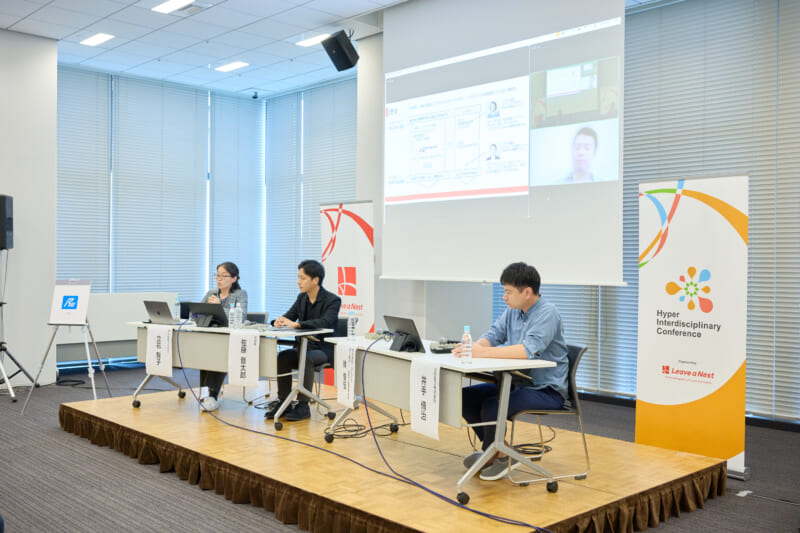News
 On August 31, RIVANES hosted a panel discussion, "Japanese Settlements and Resilience on the Occasion of Noto's Infrastructure Destruction" (session partner: Ishikawa Prefecture) at the 2024 Osaka-Kansai Conference of the Association of Transdisciplinary Research and Development, hosted by RIVANES.
On August 31, RIVANES hosted a panel discussion, "Japanese Settlements and Resilience on the Occasion of Noto's Infrastructure Destruction" (session partner: Ishikawa Prefecture) at the 2024 Osaka-Kansai Conference of the Association of Transdisciplinary Research and Development, hosted by RIVANES.
The three speakers are as follows
Mr. Shintaro Sato
Director, Creative Reconstruction Promotion Division, Noto Peninsula Earthquake Recovery and Reconstruction Promotion Department, Ishikawa Prefecture
In 2013, he joined the Ministry of Economy, Trade and Industry. In 2013, he joined the Ministry of Economy, Trade and Industry (METI), where he was in charge of revising the renewable energy FIT system, supporting overseas expansion through investment in the public-private fund "Cool Japan Organization", launching the "Town Personnel Department" policy to support local employment of young and mid-career workers, and various benefit programs to support business continuation for the Corona disaster in SMEs, etc. From 2022 he was transferred to the Ishikawa prefectural government as Director of the Industrial Policy Division. In response to the Noto Peninsula earthquake in January of this year, he assumed the newly established position of Director of the Creative Reconstruction Promotion Division in April. He has been involved in the formulation and promotion of the prefecture's Creative Reconstruction Plan and the establishment of an intermediary support organization to support local activities. He also serves as a policy advisor to the town of Kyotamba in Kyoto Prefecture. He holds a Master's degree in Regional Economics from Cornell University, USA.
Mr. Shungo Hayashi
Director/CEO, Komingle Inc.
Modern village Good start!
Representative Director, Notonokuni Hyakunen-no-Kei
Born in 1986. Born in Kanazawa City, Ishikawa Prefecture. Spent time in Kanazawa until graduating from Kanazawa University, and joined Toyota Tsusho in 2009. After working as a teacher at a private high school, he returned to Kanazawa City in April 2016 with the hope of "doing something good for the community. Upon returning home, he and his wife founded Kominguru Co. With the vision of "creating a community where people want to live and work with their families even 100 years from now," they are developing a variety of businesses. TABI-NE" has 25 private lodgings in Kanazawa. Workit," a management training program that creates interesting jobs in order to create an interesting community. He also operates "Modern Village," a self-sufficient community in Suzu City, which provides safe and comfortable energy for a prosperous life 100 years from now.
Mr. Osamuji Ide
Group Leader, Local Origination Group, Regional Development Department, Natural Power Co.
Born in Saga Prefecture, he joined Natural Power Company in 2015. After working on wind power business projects, he has been in charge of business planning for farm-based solar power and resilience enhancement since last year, as well as the operation of "Green Business Producers," a community leadership development project. His goal is to implement a new capital circulation system that reinvests in the blue earth and the next generation, rather than a one-off profitable business.
The panel session featured a discovery-free discussion by the speakers.
In the areas affected by the Noto Peninsula earthquake in Ishikawa Prefecture, the aging and declining population has made "creative reconstruction" in a sustainable manner, rather than simply restoring the area to its original state, a challenge. Mr. Sato of Ishikawa Prefecture introduced new initiatives being considered, such as the introduction of self-sustaining decentralized energy systems and the expansion of the population involved. Mr. Hayashi talked about the "modern village" project in the area, which is experimenting with energy self-sufficiency and recycling-oriented lifestyles, while Natural Power Company is developing a renewable energy business and is working to balance disaster prevention and economic efficiency by introducing a storage battery system, among other measures, Case studies from the field perspective were introduced.
What these three parties raised was the importance of human resource development. They talked about the lack of human resources capable of finding and solving problems on their own, and the need for outside support and collaboration in the reconstruction of the affected areas, as well as the need for efforts to develop and support human resources to tackle local issues, including collaboration with universities and human resource development programs by companies.
He also emphasized the importance of speedy efforts through collaboration among industry, academia, and government, and renewed his determination to work on this project from a long-term perspective.
contact information (for inquiries) (e.g. corporate phone number)
The Libanes Resilience Project
[email protected]
Attn: Tachibana, Hamaguchi
